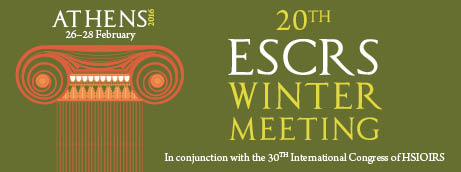Biomechanical effect of myopic SMILE compared to LASIK concurrent with corneal cross-linking (LASIK+CXL)
(results will display both Free Papers & Poster)
Session Details
Session Title: Refractive
Session Date/Time: Sunday 28/02/2016 | 08:30-11:00
Paper Time: 10:06
Venue: Skalkotas
First Author: : A.Kanellopoulos GREECE
Co Author(s): : S. Bourdou
Abstract Details
Purpose:
To evaluate the effects on corneal biomechanics as a result of low and high myopic correction performed with Small Incision Lenticule Extraction (SMILE, employing the Visumax laser, Carl Zeiss Meditec, Jena Germany) compared to Femtosecond LASIK (FS200 & EX500 lasers, Alcon Surgical, Ft. Worth, TX) and to Femtosecond LASIK concurrent with corneal cross-linking (LASIK+CXL).
Setting:
LaserVision.gr Clinical and Research Eye Institute, Athens, Greece
Methods:
30 human donor corneas formed six groups (n=5 each). Simulated low (-3.00D, groups-A, -B, -C) and high (-8.00D, groups-D, -E, -F) myopic corrections were performed: Group-A -3.00D SMILE, group-B -3.00D LASIK, group-C -3.00D LASIK+CXL, group-D -8.00D SMILE, group-E -8.00D LASIK, group-F -8.00D LASIK+CXL.
The corneas in groups-C & -F additionally received concurrent CXL with saline-diluted (0.10%) riboflavin instilled on the stroma, irradiated with high-irradiance UV-A through the repositioned flap.
Ex-vivo transverse biaxial resistance tensile strength measurements were performed; biomechanical effects were assessed via stress-strain and Young’s shear modulus. Subsequently, the specimens were subjected to enzymatic digestion resistance tests (Collagenase digestion).
Results:
Low myopia results: Biomechanical shear modulus at 10% strain was 4.2±3.2MPa in group-A, 3.9±2.5MPa in group-B and 6.8±2.9MPa in group-C. Enzymatic Digestion: Time to dissolution was 195±19min in group-A, 189±27min in group-B and 320±34min in group-C.
High myopia results: Biomechanical shear modulus at 10% strain was 3.7±2.1MPa in group-D, 2.9±2.2MPa in group-E and 4.5±2.9MPa in group-F. Enzymatic Digestion: Time to dissolution was 155±17min in group-D, 129±37min in group-E and 175±44min in group-F.
Biomechanical and enzymatic digestion results were statistically significant between SMILE and LASIK for high myopia; between LASIK+CXL and SMILE and LASIK for both low and high myopia.
Conclusions:
SMILE and LASIK appear to result in comparable biomechanical changes for low myopia; in high myopia LASIK results in reduced biomechanics. Incorporation of concurrent CXL in LASIK appears to provide significant increase in underlying corneal stromal rigidity.
Financial Disclosure:
One or more of the authors travel has been funded, fully or partially, by a company producing, developing or supplying the product or procedure presented


